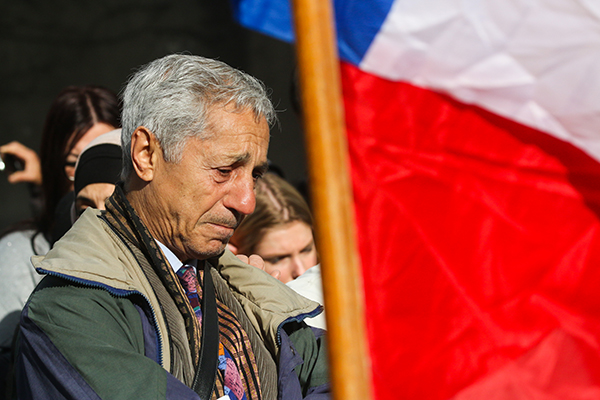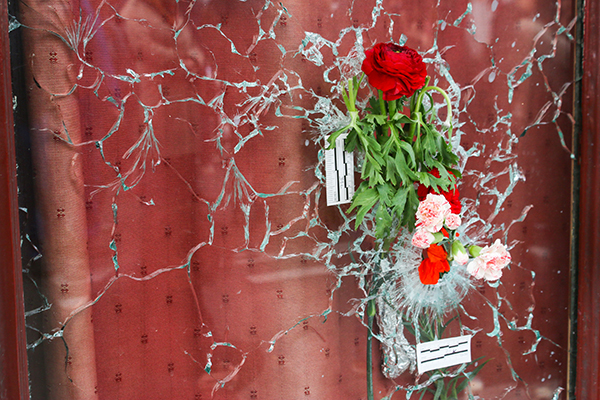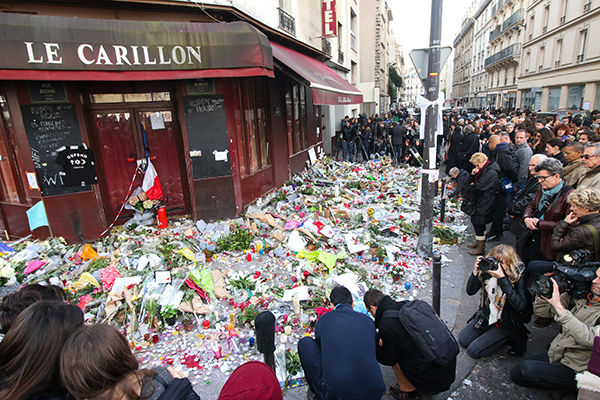
A pianist plays “Imagine,” “We Are the World,” “Let it Be” and other songs at Place de la République on Nov. 16. Credit: Yann Schreiber | For The Lantern
With candles, flowers and crowds of people singing songs like John Lennon’s “Imagine,” The Beatles’ “Let It Be” and the French national anthem, the streets of Paris are slowly showing signs of re-emerging life. Following the terrorist attacks that ravaged France’s capital city Friday night into Saturday morning, many have assembled in various locations to mourn and remember the more than 120 lives lost over the weekend.
Jessi LaHote, a third-year studying psychology and French at Ohio State, attended a memorial service while spending a semester abroad at the Institut Catholique de Paris through the International Studies Abroad program. LaHote said even though she is an American, she has been honoring the victims of the attack as a “member of the city.”
“I have this feeling of wanting to stand in solidarity with (the citizens of Paris), but at the same time knowing that I almost have to do it from a distance. It is a totally different feeling when it is some place that you call home for your whole life and where you’ve grown up and where you go out to eat every weekend, or you play with your kids in the park. It’s not the same,” she said. “I am still an outsider, but I feel like I am experiencing it with them.”
LaHote is one of 10 OSU students and one faculty member currently in France who have registered their travel with the university, according to the OSU Office of International Affairs. Seven of the 10 students are located in Paris, and all have checked in saying that they are safe.
LaHote was also in the Stade de France Friday night watching the France vs. Germany soccer game when the attacks began.
“The whole time that the game was going on, we didn’t know that there was anything going on,” she said. “It wasn’t really until we started to leave the stadium that we kind of knew that something was up.”
France’s national soccer stadium was one of six locations in France targeted by three teams of terrorists, according to CNN. The Islamic State later took responsibility for the attacks.

A man sheds a tear next to a tricolore French flag after a minute of silence on Nov. 16 near the Petit Cambodge restaurant in Paris,one of the first restaurants to be hit by the attacks on Friday. Credit: Yann Schreiber | For The Lantern
LaHote said she and the other members of her program at the game later realized that they had heard explosions outside of the stadium, but at the time did not register what the noise was.
“A lot of people are saying that it just sounded like a cannon or a firework or something like that,” she said. “So no one really thought anything of it.”
Following the game, LaHote said the group was told by the program leader to stay together. Amid panicked conversations about terrorists and the attacks, LaHote said the group managed to make it to the train station, where it embarked on a 40-minute commute back to the homestay.
“Once we got on the train, people started to have a little bit more information … people were calling their families and stuff and figuring out what was going on,” she said. “But basically up until we got back to our homestay, we didn’t know any information besides the rumors flying from the people on the train.”
In the days following the attacks, LaHote said the atmosphere in the city is “definitely very somber,” but added that a sense of resilience prevails.
“There is a lot of pride, there is definitely a lot of French pride right now,” she said. “There is also this sentiment of, ‘All right, we have to keep moving on and we have to keep living our lives.’”
Yann Schreiber, a graduate student pursuing his master’s degree at the Sciences Po Journalism School in Paris, said he is happy to see that the city’s optimism is returning.
“Life is coming back. And I am glad it is coming back because it has to come back,” said Schreiber, who wrote for The Lantern when he studied at OSU during the 2014-15 academic year.

Flowers have been placed in a bullet hole at Le Carillion restaurant, seen Nov. 16. Credit: Yann Schreiber | For The Lantern
Schreiber said he was out for a walk on Friday when he first heard of the attacks via Twitter. Seeing that he was close to one of the restaurants people were tweeting about, he ran to Café Bonne Bière, where a shooting had recently taken place.
“I saw a lot of medics, ambulances, cars (and) police starting to arrive. Police had already cordoned off a little bit, but I could get really close,” he said. “That’s where I took those first pictures with the medics. And that’s where I saw from a distance two bodies covered, but they were bodies — at least one carried out from the restaurant (on) a stretcher.”
Schreiber, like LaHote, said there was initially a lot of confusion surrounding the attacks. After leaving the scene at Café Bonne Bière, he made his way to the Bataclan concert hall, where a hostage situation was underway. Once there, Schreiber said he saw news teams pull up in protective gear and immediately was hit by the seriousness of what was unfolding inside the hall.
“When I saw those bulletproof vests, I was like, ‘It is getting real. Something is going on that is a little bigger than I thought,’” he said, adding that up until this point, it was still unclear whether the events of the evening were connected.
At least 89 people were killed inside the Bataclan, the bloodiest attack of the evening.
Schreiber said he mostly approached the weekend’s events as a professional journalist but added that he also feels for the victims on a personal level.
“What we had here was a carnage. That was horrible … it wasn’t even murder. That was more than murder,” he said. “You don’t get angry because you don’t know against whom you should get angry. You get sad. You are saddened.”
Like LaHote, Schreiber said he is confident that Paris will rise again from these tragic events.
“The general feeling in Paris is stuff is going back. We can’t make them win,” he said. “There is no way this city will let anyone win that just randomly shoots people down because of hatred. That will not happen.”

People lay flowers and candles in front of the Le Carillon restaurant, one of the first locations hit by Friday’s attacks, together with the Petit Cambodge restaurant, in Paris on Nov. 16. Credit: Yann Schreiber | For The Lantern


